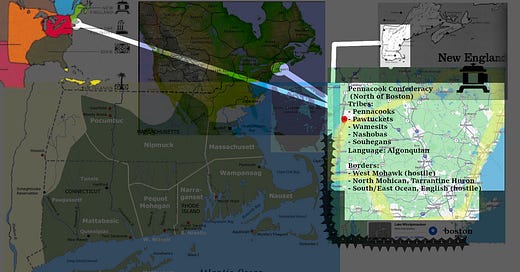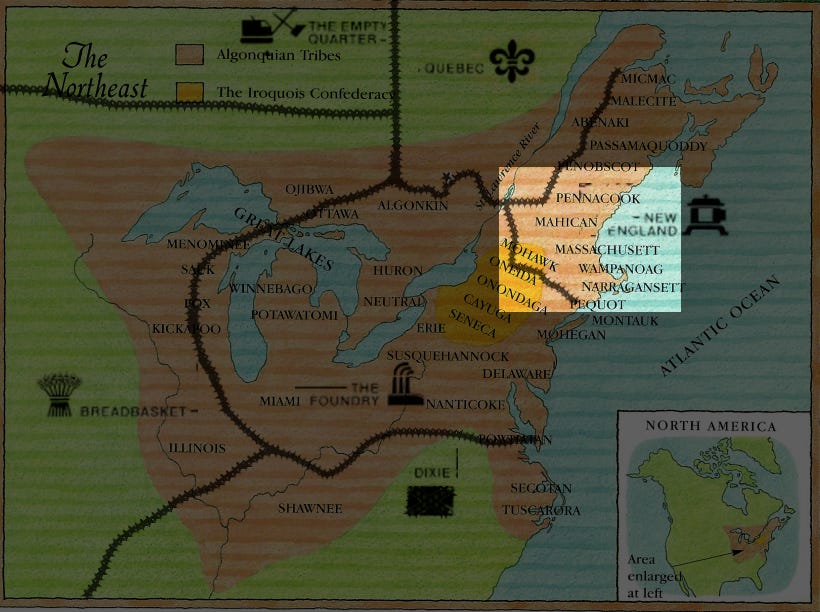Nine Nations New England/Foundry
The starting point of British conquest
“The white men are the sons of the morning. Never make war with them. Sure as you light the fires, the breath of heaven will turn the flame upon you, and destroy you.” - Passaconaway of Pennacook Confederacy
The words of chief Passaconaway proved prophetic. The British were in the habit of punishing those who allied against them after settling wars. The British allied with the war-like Iroquois Confederacy against the greater number of Alonquian Tribes and French. The English operated by seeking trade networks and allies and to destroy or disadvantage their enemies. It so happened that the British-Iroquois prevailed over the French-Alonquian alliance - and once vanquished, the British acted to neutralize the tribes of their former enemy after Frexit. In a similar way the Cherokee nation to the south suffered from their alliance with the Dixie rebels after losing the American Civil War. Native nations were progressively whipsawed into defeat by ruthless politics and the slow edge of superior European military technology in firearms. Finally - in a similar regard once the Americans kicked out the British it was the formerly aligned British tribes turn to be fatally undermined by the triumphant Americans. Before getting to that, its important to keep in mind how precarious the position of the English was at the time of the Pennacook confederacy. Again - it was this dynamic coupled with the military superiority of European firearms that ultimately conquered the continent.
There were war scares in southern New England in 1666…. all male residents in Chelmsford over fifteen years of age were ordered to provide a five-foot club with a knob on the end.
…
As panic and hysteria spread in Chelmsford… the Massachusetts Bay Colony government sent two companies of militia into Merrimack Valley… By the beginning of 1676, Dunstable and Chelmsford were the only inhabited towns west of the Concord River. Almost the entire outer ring of the eastern frontier of Massachusetts Bay had been destroyed… Many believed that only drastic measures would prevent the English from being driven back to the sea.
…
The English invaded the village, set fire to the wigwams, and burned to death all who remained inside…
As disorganization spread the fearsome Mohawks in the west launched a series of raids against the Pennacook in New England."
This corner of the Nine Nations - where the Foundry and New England meet is created by the Hudson river. It marks the foothold of the English - who moved up the coast before moving west - for fifty years Lowell marked the first frontier for the English before conquering the Pennacook.
The defeated Pennacook had no place to go. There was no escape from the advance of the English. A retreat into the interior would lead them into the hostile Mohawks, one of the Five Nations of the powerful Iroquois Confederacy.
The Foundry was only established as the fur trade and water based routes of canals and rivers that evolved as a trading zone among settlers and natives. New England, by contrast, was settled by pushing back and annihilating the coastal tribes rather than economic integration - at that time the European colonizers could not go west.
New England is unblessed agriculturally, has few raw materials … long ago the textile manufacturers moved to Dixie (after the invention of the air conditioner in Foundry city Buffalo, NY)… the iron makers moved to the Foundry where ore and coal were… in general industry continues to march west, partly because its easier to distribute goods from a central point on the continent than it is from Manchester, New Hampshire.
What New England has are not physical resources, but resources of the mind. It was the New England-Foundry alliance that ultimately defeated Dixie in the Civil War. The Foundry’s opposition to Dixie and slavery was about two conflicting economic models. The factory and wage model had freed persons drawing wages for labor - opposed to the feudal slave agrarian south. New England elites led the intellectual challenge to slavery alongside The Foundry’s economic one. Today New England’s academies, think tanks and media centers project an identity of America that is larger than their relative size and economic importance. The major surviving preoccupation and interest of New England is keeping from freezing in the winter. Then as now this common and recurring acute interest is what aligns New England most especially with western Europe and Old England - who are in the same boat of energy dependence and harsh winter.
References
Eno, Arthur L. Cotton Was King. 3rd ed., New Hampshire Publishing Company, 1976.
Garreau, Joel. The Nine Nations of North America. 1st ed., Avon Books, 1981.
Struggle for a Continent. The French and Indian Wars 1689-1763. Harper Collins. 2000.




